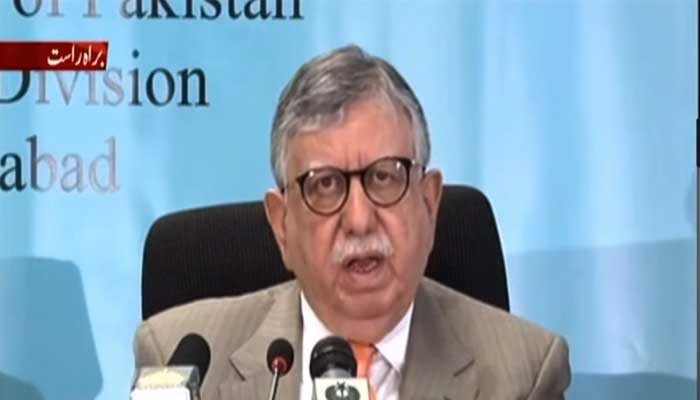ISLAMABAD – Federal Minister for Finance Shaukat Tarin said on Thursday and Pakistan’s economy grew 3.9 percent during first nine months of the fiscal year 2020-21, surpassing a projection of 2.1% amid COVID-19 challenges.
Tarin, accompanied by Minister for Industries and Production Khusro Bakhtiyar, Commerce Adviser Razak Dawood, Special Assistant on Poverty Alleviation Sania Nishtar and SAPM on Revenue Waqar Masood, launched Pakistan Economic Survey 2020-21.
He termed the services and manufacturing sectors key drivers behind the unexpected growth during the outgoing fiscal year.
The minister said that effective policies announced by the Imran Khan-led government during the COVID-19 pandemic helped country to heads towards stability.
Total debt and liabilities decreased by almost 8% in one year. Total debt and liabilities stood at 95.3% of GDP at the end of third quarter of 2020-21 as against 103% of GDP inthe comparable period last year, he said.
Shaukat Tarin said FBR collection has surged by 18% as compared to the last year. The revenue collection has so far reached 4.2 trillion rupees, expressing the confidence that it will exceed the target of 4.7 trillion rupees by the end of this financial year.
During the current fiscal year, the total revenue as percent of GDP stood at 15.1 percent whilst total expenditures at 23.2 percent. Thus, fiscal deficit stood at 8.1 percent.
Despite the “cotton crop getting ruined,” Tarin stated large-scale manufacturing (LSM) grew by 9%, while agricultural grew by 2.77 percent — against a goal of 2.8 percent.
Despite the poor performance of the cotton crop, he claims that other crop yields compensated for it, resulting in 2.77 percent increase in agriculture overall.
The finance minister said the government wanted to control inflation “but prices are still high and affecting the common man”.
“So the way to solve this is by increasing production and that is why we have focused on agriculture in this budget,” Tarin said.
Tarin said he advised Prime Minister Imran Khan that it was time to concentrate on long-term growth “till we get to 5-8 percent GDP growth.”
“We will do interventions and take care of the poor. The poor man has been crushed in this stabilisation phase because the dreams we have shown them have been of a trickledown economy. And this can only happen when growth is sustainable and continuous for 20-30 years,” he said.
Tarin, on the other hand, stressed that this expansion should not be financed by borrowing.
“Countries which had sustainable growth, they grew continuously for 20-30 years. What have we done? Every time we grow by borrowing money, which is credit-based growth.”










